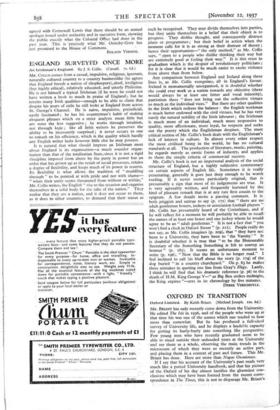ENGLAND SURVEYED ONCE MORE
An Irishman's England. By J. S. Collis. (Cassell. 7s. 6d.)
MR. COLLIS comes from a casual, impulsive, religious, ignorant, naturally cultured country to a country businesslike (he agrees that England breeds a nation of shopkeepers), aloof, irreligious (but highly ethical), relatively educated, and utterly Philistine. He is not himself a typical Irishman (if he were he could not have written a book so much in praise of England), but he retains many Irish qualities—enough to be able to claim that despite his years of exile he still looks at England from across St. George's Channel. He is naive, impulsive, prejudicial, easily fascinated ; he has his countryman's habit of making eloquent phrases which on a strict analysis mean little but are none the less suggestive ; he works through intuition, not through logic ; like all Irish writers he preserve& the ability to be incessantly surprised ; it never occurs to one to remark on his efficiency, which is the quality which hardly any English writer lacks however little else he may possess.
It is natural that what should impress an Irishman most about England is its organisation—a much sounder organ- isation than that of the totalitarian State, since it is not a rigid discipline imposed from above by the party in power but an order that has grown up as the result of social processes, retains a degree of flexibility, and keeps much of its power in reserve. Its flexibility is what allows the tradition of " muddling through " to be pointed at with pride and not with shame- " when their unity seems threatened from without or within," Mr. Collis writes, the English " rise to the occasion and organise themselves in a solid body for the sake of the nation." They realise that they are a nation, and it does not occur to them, as it does to other countries, to demand that their status as
such be recognised. They may divide themselves into ,parties, but they unite themselves in a belief that their object is to progress. They dislike thought, and consequently distrust plans or programmes ; but their belief in action when the moment calls for it is as strong as their distrust of theory ; hence their opportunism—" the only method," as Mr. Collis says, "open to a people who dislike thinking their way but are extremely good at feeling their way." It is this trust in gradualism which is the despaii of revolutionary politicians ; for it is clear that it would be much easier to excite violence from above than from below.
Any comparison.- between England and Ireland along these
lines is, as Mr. Collis recognises, all in England's favour. Ireland is monumentally unorganised, it is doubtful whether she could ever work as a nation towards any objective (there would always be at least one bitter and vocal minority), patriotism there " does not bring out the collective virtues
so much as the individual vices." But there are other qualities in the Irish which redress the balance : the English workman is much better endowed with the civil virtues, but he has very rarely the natural nobility of the Irish labourer ; the Irishman is much more of an individual, much more responsive to quality, more affectionate, more loyal, he respects and seeks out the poetry which the Englishman despises. The most critical section of Mr. Collis's book deals with the Englishman's lack of interest in culture. In almost every other respect the most civilised being in the world, he has no cultural standards at all. The production of literature, music, painting, he regards merely as exotic forms of industry, and applies to them the simple criteria of commercial success.
' Mr. Collis's book is not an impersonal analysis of the social structure of England, but a highly subjective commentary on certain aspects of English life. Sometimes it is really penetrating, generally it goes just deep enough to be worth- reading. If it never seems particularly original, that is presumably a sign that most of its judgements are true. It is very agreeably written, and frequently leavened by the kind of pleasant remark that is at any rate first cousin to the epigram. A few details invite a passing comment. It is both priggish and untrue to say (p. 172) that " there are no- adult gentleman boxers, jockeys or association football players ". Mr. Collis has presumably heard of the Corinthians, and if he will reflect for a moment he will probably be able to recall-. the names of at least one boxer and one jockey whom he would agree to be an " adult gentleman." It is not a fact that " you won't find a clock in Oxford Street " (p. 2 1). People really do not say, as Mr. Collis imagines (p. 209), that " they have not been to a University, they have been to ' the Varsity.' " It is doubtful whether it is true that " to be the Honourable Secretary of the Something Something is felt to convey an honour " (p. 185). It seems an unfortunate moment to write (p. 196), " Now that the Bible is no longer read." I feel inclined to call his bluff about the story (p. 174) of the dog buried " in a country churchyard." On p. 83 he makes three mistakes in quoting one line from Gray's Elegy. Lastly, I think he will find that his dramatic reference (p. 36) to the death of H.M. King George V—" as Big Ben strikes midnight, the King expires "—errs in its chronology by five minutes.
DEREK VERSCHOYLE.














































 Previous page
Previous page